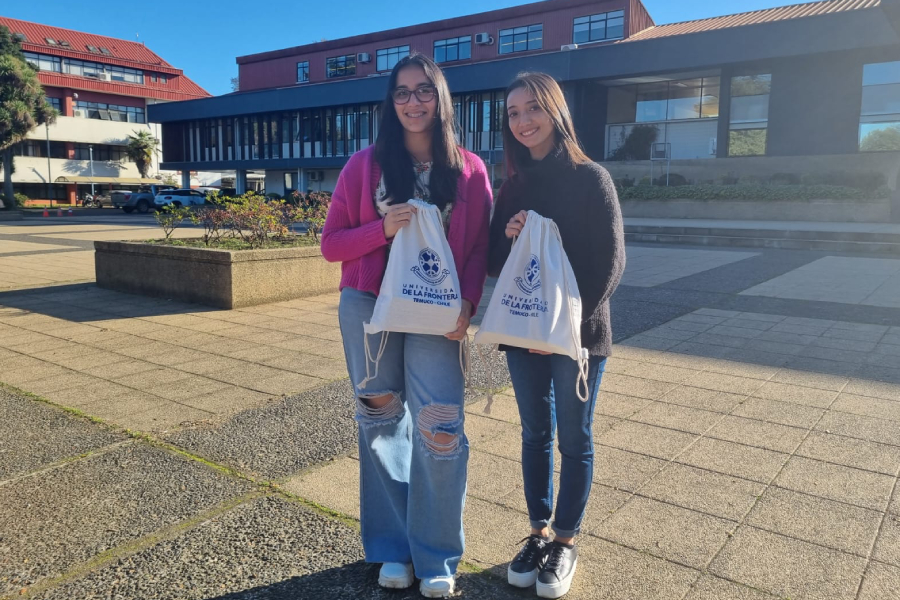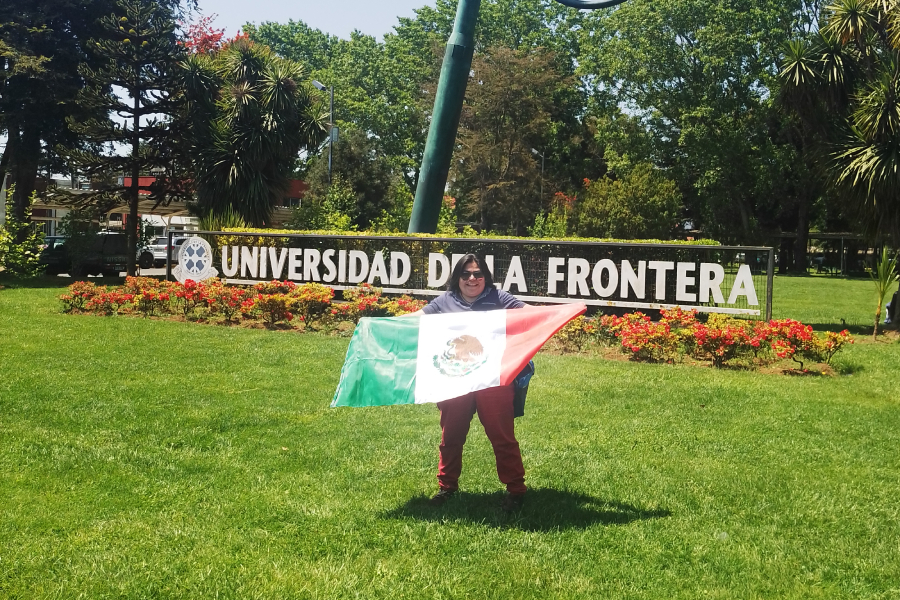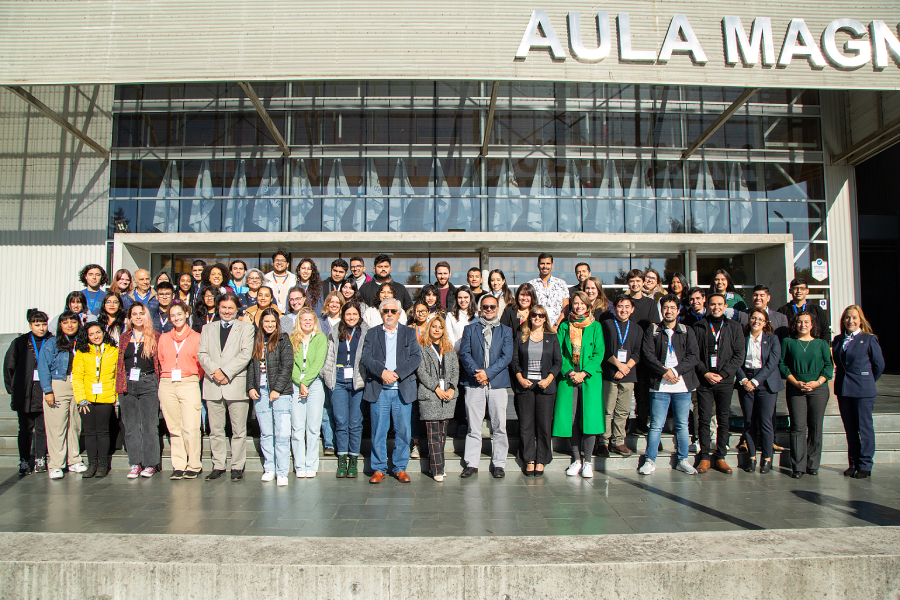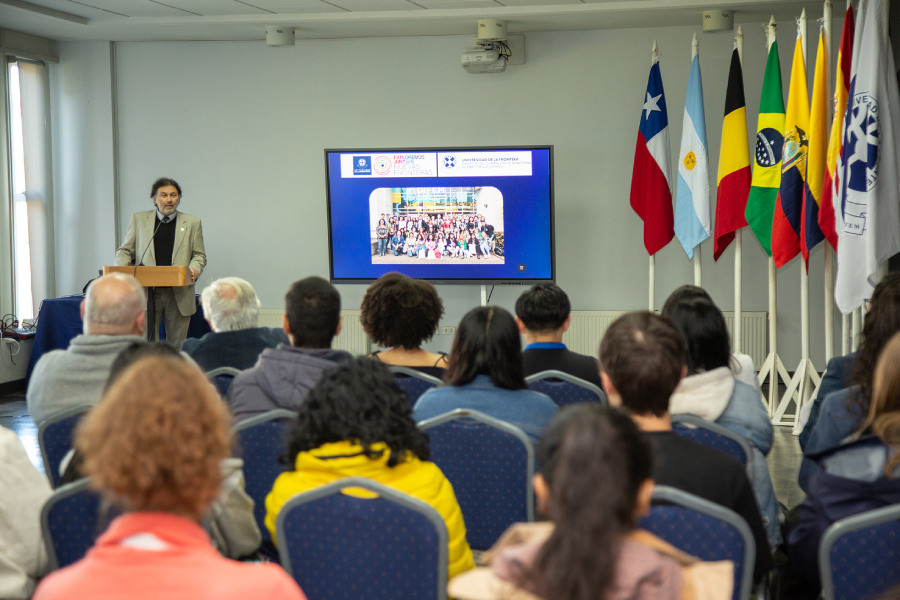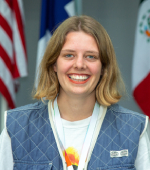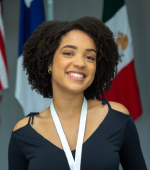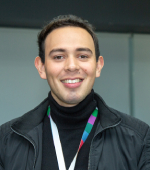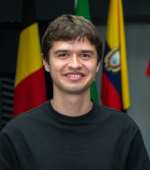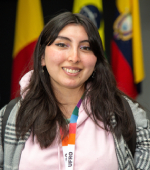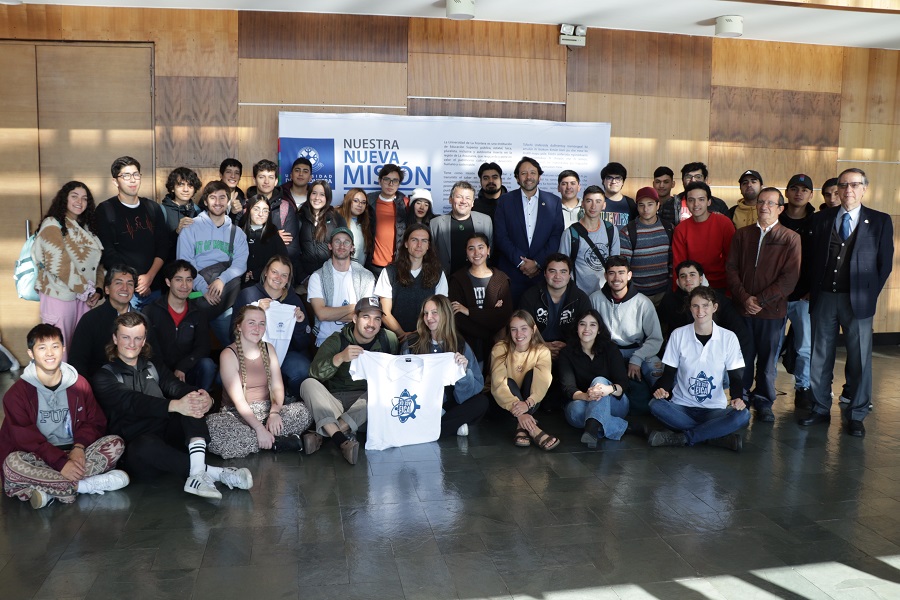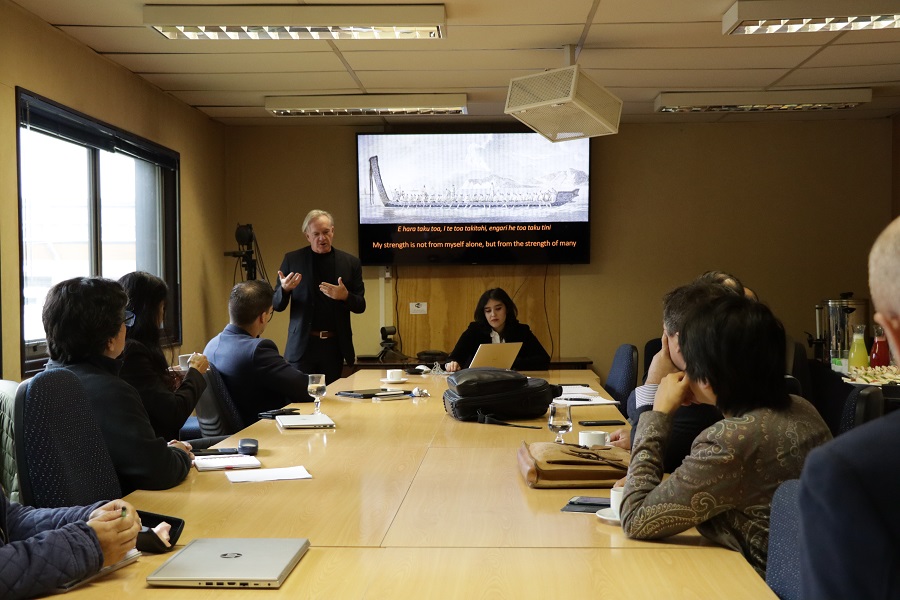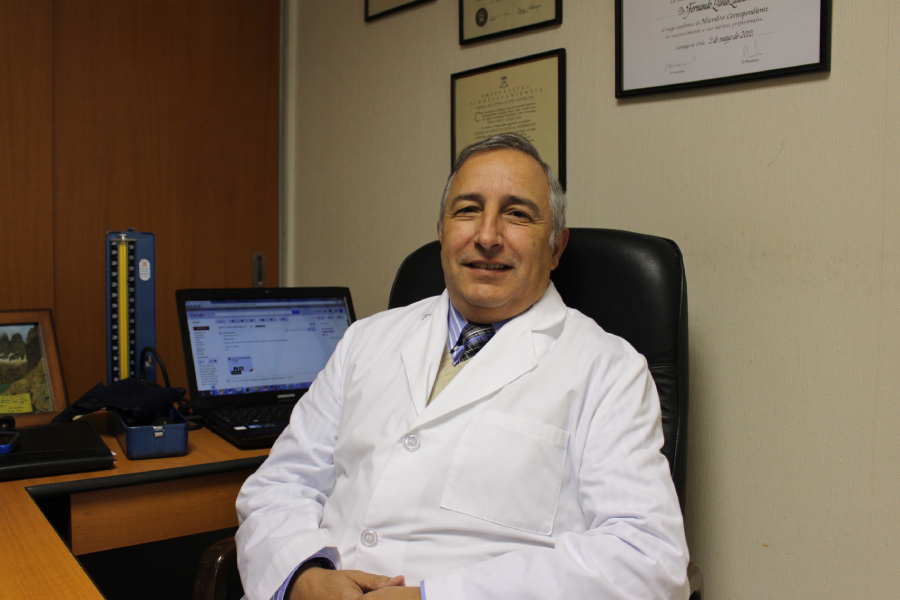|
Thanks to the MITACS-Canada programme and its agreement with the universities of CRUCH, Catalina Valdebenito Gallardo and Martina Campos Torres are able to spend 12 weeks as research assistants for different research projects at Canadian universities, under the supervision of outstanding researchers. |
With great joy, Universidad de La Frontera (UFRO) received the great news that two of the seven scholarships of the MITACS Globalink Research Internship (GRI) programme in Canada go to the UFRO undergraduate students Catalina Valdebenito Gallardo of the Law programme and Martina Campos Torres of the programme in Pedagogy in History, Geography and Civic Education. This scholarship gives them the opportunity to spend 12 weeks (between May and October) as research assistants at Canadian universities. Catalina Valdebenito Gallardo, a student of the Law programme of UFRO, will use this scholarship to collaborate in the project “Embracing Indigenous Rights via the UN Declaration on the Rights of Indigenous People, AMDRIP and International Trade Agreements” of the academic Bradford Morse, at Thompson Rivers University in Kamloops (British Columbia). “I will investigate the progress of the rights of indigenous people in each country and the compliance with the corresponding treaties. It is a great challenge, since this will be the continuation of a project which the same professor started with another exchange student last year,” she explained. At the same time, Martina Campos Torres of the Pedagogy in History, Geography and Civic Education programme of UFRO will work together with the academic Janet Okoko of University of Saskatchewan in Saskatoon (Saskatchewan) on the project “Strengthening Instructional Leadership Capacity for Practitioner-Oriented and Technology-Mediated Educational Research to Support Student Learning”. The students commented that they are very grateful for all the support they received in this process by the university and especially by those who are part of their study programmes. “My professors and the director of the programme were really helpful, so I was able to finish the semester earlier, in order to start my stay without worries. I wanted to apply for this scholarship, because it is rather uncommon to find one that is dedicated to research, which is my field of interest for my future graduate studies. I wanted to take this opportunity to learn how to do research, since we learn about it in theory, but I think that it will be quite different to apply this knowledge in practice”, Martina Campos said. For Claudia Villagrán, the person in charge of outgoing mobility at the International Affairs Office, this opportunity is very important for the whole university community of UFRO, since it directly contributes to UFROs internationalisation process. In this context, she pointed out: “We want to support our students in the process of application for existing scholarships, funding and mobility programmes, because we are convinced that, especially in this case, it is a tremendous opportunity for both of them. They both received a lot of support by the university and especially by their programme directors, who fully supported them in this process previous to their stays”. It is also worth mentioning that the scholarship of the Globalink Research Internship programme is worth about 12,000 Canadian Dollars and financed by MITACS and the universities of the Council of Rectors of Chilean Universities (CRUCH). It provides real opportunities of growth regarding research and innovation, and allows students to spend three months supporting scientific research in the fields of science, engineering, mathematics, humanities and social sciences.
Written and translated by: UFRO Communications Office
|
|
Karla Ávila Merino carried out her Master’s studies at Autonomous University of Puebla in Mexico and came to Chile to study three subjects of the Master of Business Administration at Universidad de La Frontera. |
One of the objectives of Universidad de La Frontera (UFRO) is to promote the undergraduate and graduate mobility, being convinced that national and international student mobility opens great learning opportunities and personal growth. In this context, Karla Ávila Merino carried out her Master’s studies at Autonomous University of Puebla (BUAP) in Mexico, what allowed her to come to Chile for three months and to take three subjects of the Master of Business Administration (MBA) of the Faculty of Law and Business at UFRO, thanks to a mobility and cooperation agreement between both universities. For the welcome ceremony for the new graduate students 2023, the Master of Business Administration asked the Mexican student Karla Ávila to share her impressions about her stay in Chile and the training process at UFRO. MOBILITY AT UFRO The idea of carrying out her Master’s studies in Chile started about ten years ago. “I tried more than three times to go, but without success. However, after finishing my studies at BUAP in Mexico, I finally had the chance to go to Chile and to take three subjects at Universidad de La Frontera,” she explained. Karla pointed out that, among the possible universities for her mobility, UFRO was the only one that met all the requirements, which is why she chose to come to UFRO. According to Karla, the choice of the university consisted of a comprehensive search, in which she tried to find a program with similar standards to her study programme at BUAP in Mexico. Therefore, she made the corresponding consultations and compared different options, among which UFRO was the one that met all her requirements, since it had the corresponding mobility agreement, the Master’s programme and similar bases. “My stay at UFRO allowed me to broaden my horizons and to make new experiences. I would definitely recommend others to make use of mobility opportunities at UFRO, in order to live such a great experience in the beautiful La Araucanía Region,” she said.
Written by: Carlos Sáez Figueroa |
|
More than 30 students arrived at UFRO this semester, what confirms the strong international partnerships of UFRO and the perceived high academic quality. |
Universidad de La Frontera (UFRO) continues its path of internationalisation and welcomes through the International Affairs Office the foreign and national students who join the faculties and programmes of the university this semester. The deputy rector, Dr. Rodrigo Navia Diez, was very pleased to receive the group of 30 students, who came to this regional and public university for professional, but also cultural and personal growth. “The academic part is only one part of the challenge. There is also the personal development, when you are part of a different local and university community, with all its environmental, sportive and cultural opportunities,” Navia said. INTERNATIONALISATION AT THE UNDERGRADUATE LEVEL During this first semester of 2023, UFRO receives these students from different European and Latin American countries, such as Argentina, Belgium, Brazil, Colombia, Ecuador, the United States, Spain, Finland, Italy and Mexico, who will be part of the different study programs at the six faculties of Universidad de La Frontera. Apart from the cooperation and mobility agreements between UFRO and universities in different parts of the world, which allow the mobility of these students, some of them also benefit from different scholarships, for example through the exchange program of the International Federation of Medical Students Associations (IFMSA) or the Fulbright Scholarship Program. One of the students from Universidad Mariana in Colombia came to UFRO to participate in the Interdisciplinary Rural Internship Program of the UFRO Faculty of Medicine, and to carry out an internship in the rural areas of Melipeuco in the La Araucanía Region. NATIONAL MOBILITY In terms of national mobility, two students from Universidad de Antofagasta in the north of Chile will spend this semester at the Faculty of Engineering and Science and a student from Universidad de Los Lagos in the south of Chile will spend a semester at the Faculty of Medicine. IMPRESSIONS
Written and translated by: UFRO Communications Office
|
|
A delegation of ten architecture students and four academics from Auckland University of Technology in New Zealand visited Universidad de La Frontera within the framework of a cooperation agreement with the Faculty of Engineering and Science. |
During their stay in Chile, the delegation of academics and students of the Bachelor of Architecture and Future Environments of Auckland University of Technology (AUT) in New Zealand visited the Andrés Bello Campus and Pucon Campus of Universidad de La Frontera (UFRO) and got to know some of the beautiful landscapes of the La Araucanía region. The delegation, consisting of Dr. Yvonne Chan, the Director of Engagement of the Faculty of Design and Creative Technologies; Dr. Charles Walker, the Head of the School of Future Environments; Dr. Ricardo Chacón Mestre, the International Partnerships Manager of the Faculty of Design and Creative Technologies; Tessa Forde, a teaching assistant and PhD student; and ten students of the Bachelor of Architecture and Future Environments, visited the La Araucanía region’s lake area and the city of Temuco, getting an idea of the intercultural aspects that have defined the local and part of the national architecture. Some of the points addressed in the meetings with university authorities of UFRO, such as the Vice-rector for Research and Graduate Studies, Dr. Rodrigo Navia Diez, and the Dean of the Faculty of Engineering and Science, Dr. Jorge Farías Avendaño, were the collaboration in research, academic and student mobility in the areas of undergraduate and graduate studies, and the project proposal for a new Architecture study programme at UFRO. At the same time, the students had the chance to interact with their peers of the Construction Engineering and Civil Engineering programmes at UFRO. These encounters made their five-day visit to the La Araucanía Region even more enriching. In this context, it is worth mentioning that this academic trip, financed by the Prime Minister’s Scholarships for Latin America (PMSLA), took place within the framework of the AUT “Study Tour” course, which allows the students from New Zealand to visit different cities in Latin America. In the case of this group, they selected Valparaiso in the centre of Chile, visiting the university Pontificia Universidad Católica de Valparaíso, and Temuco in the south of Chile, visiting Universidad de La Frontera through its Faculty of Engineering and Science. At the end of their visit, the students of AUT presented the conclusions of their stay in Chile and the projects they are currently working on in the fields of social housing, urban landscaping, incorporation of indigenous values and identity associated with public spaces, among others. IMPRESSIONS “We are very happy about this visit, which is part of a work plan that we are implementing in a very proactive and reliable way, to advance, among others, in the development of an architecture undergraduate programme at our faculty, and in matters of student mobility and issues related to interculturality. Visits like these allow us to complement our views and are a direct benefit for the students of both universities,” explained the Dean Dr. Jorge Farías. The delegation from AUT also had a very positive impression of the work developed at UFRO during their stay. “New Zealand and the La Araucanía region have a lot of things in common, but there are also a lot of differences, what motivates us even more to work together, since it will benefit both universities. Interculturality, for example, is one of the topics that truly connects both of our countries,” pointed out Dr. Ricardo Chacón. “We are making progress regarding the partnerships with these two universities and we are excited to see that there are so many opportunities for creativity in Chile, with the additional element of indigenous values. In our architecture study programme, the Maori culture and others are very present and UFRO, in its project proposal for an architecture study programme, could add the worldview of its indigenous peoples, too. That is one of the aspects that motivates us for this collaboration, as well as the possibility of carrying out joint research,” added Dr. Yvonne Chan. The student Cleo Arminglat from New Zealand was also very happy about this opportunity. “We really like the La Araucanía region, because it is very similar to New Zealand, even in its volcanic history. It was very interesting to talk to other students and to share our experiences of studying in different countries. I also improved my Spanish and learned a lot about engineering and architecture in Chile,” she explained. The visit and activities were organised by the Internationalisation Unit of the Faculty of Engineering and Science of UFRO, through Susana Candia Palma, within the International Cooperation Agreement, which primarily focuses on the fields of undergraduate and graduate education, research, interculturality, gender and outreach. Written by: Daphne Bormann Parada |
|
The academic Dr. Fernando Lanas Zanetti of the Centre of Excellence in Training, Research and Management for Evidence-based Health (CIGES) and the Department of Internal Medicine, is part of the work group that will develop a general framework for the treatment of these two pathologies that are the leading cause of death in Chile and other parts of the world. |
The first meeting of the committee took place in New Orleans, with experts from different parts of the world and Dr. Fernando Lanas Zanetti as a representative of South America. The goal is to work together on a document that provides guidelines and a strategic framework for Ministries of Health all over the world, considering the conditions of the different countries. The academic Dr. Fernando Lanas Zanetti of the CIGES Centre of Excellence and the Department of Internal Medicine of the Faculty of Medicine of Universidad de La Frontera (UFRO), is part of this work group that will develop a general framework for the treatment of these two pathologies that are the leading cause of death in Chile and other parts of the world. In this context, it is worth mentioning that the World Health Organisation had a strong focus on preventive aspects, such as COVID-19 vaccines, the eradication of malaria and other infectious diseases, but also of chronic diseases, cardiovascular diseases and cancer. Other preventive aspects were campaigns against smoking or for the control of blood pressure, cholesterol and obesity, but this approach has changed. “The WHO realised that these measures were insufficient to meet the goal of decreasing the mortality from chronic diseases by 2030. That is why they decided to explore a new area for them, which is the treatment of heart attacks and strokes, which are the leading cause of death in Chile and other parts of the world,” commented Dr. Lanas. Thus, WHO set up a group of experts from different countries around the world to develop treatment strategies for acute coronary syndrome (pre-heart attack and heart attack) and strokes. After the first meeting, global experts and the WHO directors for chronic and cardiovascular diseases focused on the three critical areas of global failure. The first one is related to heart attacks, strokes and the medical capacity to unclog arteries. PREVALENCE OF HEART ATTACKS AND STROKES “The vast majority of heart attacks is caused by a complete or partial blockage of a heart artery, while strokes are mainly caused by a blood clot that blocks or narrows an artery leading to the brain. These blood clots can be destroyed with special intravenous medication or a catheter and a special balloon, but you have to act quickly, because once the artery is clogged, the neurons or heart muscle fibres begin to die and the more time you wait after the first symptoms, the more damage is done. After a certain lapse of time, it is not worth doing anything anymore, because there will only be dead cells left that will scar the person for life, if the person survives,” explained the cardiologist Dr. Lanas. That is why it is important to recognise the symptoms and to know what to do. Therefore, the different governments and their health services need to launch educational campaigns that make people more conscious about the presence of symptoms and that teach them about when to occur to a doctor. “The faster the better,” the cardiologist affirmed. The second aspect is to train the health teams, so they recognise when a heart attack or stroke is on the way. “First, you have to see the physical exam, which is an electrocardiogram that needs to be interpreted by a specialist. In Chile, we have an advanced online transmission system that transmits the data to a 24/7 central control centre in our capital city Santiago de Chile, where a cardiologist prepares an immediate report. If there are signs of a heart attack, the patient must be referred to an establishment where this procedure can be done – in Temuco, it is the public ‘Hospital Dr. Hernán Henríquez’ or the private clinic ‘Clínica Alemana’ – so the referral system has to be fast for patients who live more isolated. Another option is the use of thrombolytic medicine that dissolves the clots. They are available in all of our emergency services,” Dr. Lanas explained. The registry of the PURE project in Temuco shows that, currently, there are more strokes than heart attacks. Out of 100 heart attacks, 75 occur in men; women present fewer heart attacks and at a more advanced age. Strokes occur more evenly in men and women, on average 10 years after a heart attack. “A stroke is more complex than a heart attack, because the crucial exam is a brain scan, which is not available everywhere,” said Dr. Lanas. The third important aspect is to have a clear referral system that includes all health services, which is more complex for arterial procedures and brain scans. “We are advancing with that in Chile, but there are a lot of countries in the world that are not. We have access to thrombolytic drugs or other drugs such as aspirin or those that lower the cholesterol level. The WHO will work with the health ministries around the world to implement these measures and to see if we can reduce cardiovascular mortality by 30% by 2030,” concluded Dr. Lanas. In Chile, we already made a lot of progress regarding the aspects that are part of the strategic framework, although there are still a lot of details missing. The aim of the global strategy led by WHO, in which Dr. Fernando Lanas plays a leading role, is to make further progress, but in all countries in the world. Written by: Fabian Aguirre Silva |





